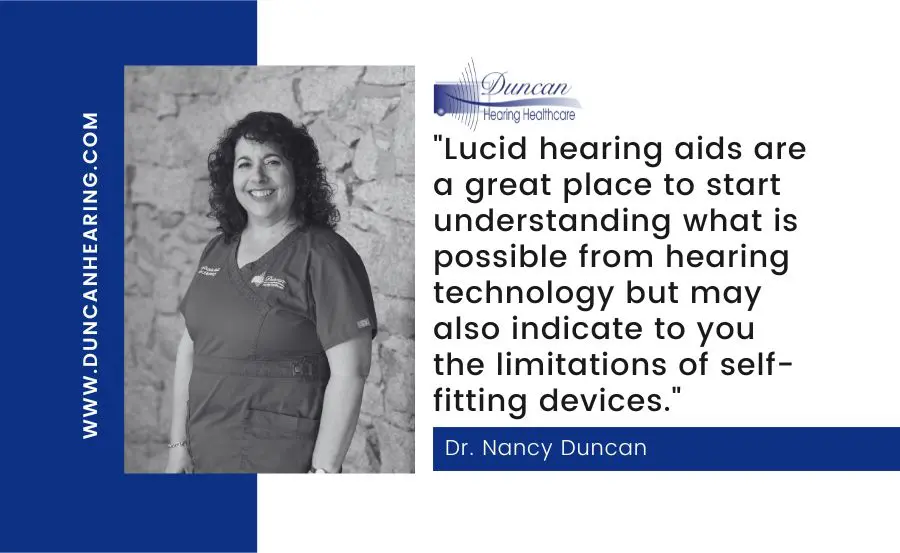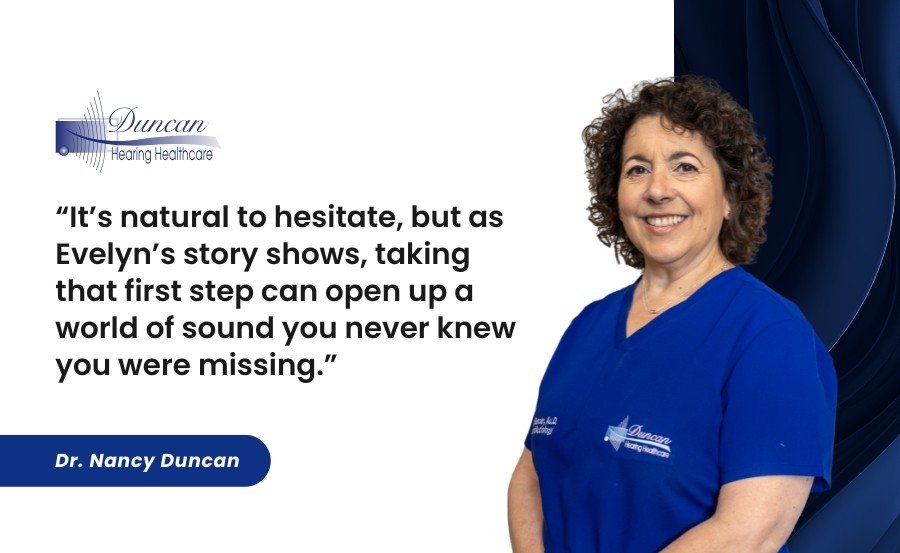Nov 10, 2022
|
Nancy Duncan, Au.D.
How to Improve the Performance of a Lucid (Over-the-Counter) Hearing Aid| An Audiologist’s Input
If you have Google searched your way to this article, then it is probably safe for me to assume that you own a pair of Lucid hearing aids and are not completely satisfied with your purchase.
Before we get started on troubleshooting Lucid hearing aids, I want you to know that I admire you.
Many audiologists are in support of the newly approved over-the-counter hearing aids because these new devices mean that more people, like you, are recognizing and choosing to address a hearing challenge that might have gone unaddressed if a visit to an audiologist was still required.
Lucid hearing aids are a great place to start understanding what is possible from hearing technology but may also indicate to you the limitations of self-fitting devices.
Through this article, I am going to give you four tips that should help improve the performance of your Lucid hearing device, and I will also provide an invitation for you to find further support should you need it.
https://duncanhearing.com/wp-content/uploads/2022/11/lucid-hearing-aid.jpg
Tip #1 – Get the Right Fit
Prescription hearing aids boast of using “custom earmolds” which make sure that the hearing aid is custom fit to the individual’s ear, while OTC devices provide several different sizes of tips. This requires the user to select which tip best fits his or her ear.
If your device is falling out or uncomfortable, then be sure to check your box for other tip options. Give each of them a try until you find the one that provides the most secure and comfortable fit.
Your OTC device should not be at risk of falling out and should feel comfortable for an extended wearing time.
Tip #2 – Let’s Understand the “Listening Bubble”
Your Lucid device has a microphone that picks up sound and amplifies the sound to your ears.
The “listening bubble” is what determines how clear or loud the sound is and is essentially the distance that the microphone is designed to work and amplify sound in.
For example, if you are in a room without a lot of noise, then your “listening bubble” will make for a comfortable experience to hear the conversation in, as there is only one source of noise/sound. But, if you are at a party or a restaurant with a lot of background noise, then you will find that your microphone will pick up a lot more sound and noise, which will make it more difficult to focus on the conversations close to you.
This is one of the major ways in which over-the-counter devices and prescription hearing aids are different. While OTC devices work as amplifiers, prescription technology makes sure that you only pick up the sounds/tones that your natural hearing would otherwise miss.
https://duncanhearing.com/wp-content/uploads/2021/06/Duncan-OTC-blog-CTA-Banner.jpg
Tip #3 – Get Rid of Background Noise
This might seem obvious, but it is still important.
Limit background noises in your environment when you are using your Lucid hearing device. For example, if you are having a conversation, turn off the TV or move to a place in the room where the other noises are further away.
Any additional sound your microphone picks up will be amplified. Thus, you will experience an odd listening environment, as most of the noises our brains are used to hearing are not processed.
Tip #4 – Come In for a Hearing Test
In my humble opinion, this is probably the most important tip. Unless you have had your hearing tested recently, your OTC device will struggle to deliver on its promises using the standard settings it comes with.
There is a reason we are fond of using the comparison of “readers” and OTC devices. They both deliver a one-size-fits-all approach that works for some but is not based on a prescription and, thus, is not as accurate.
I want to encourage you to visit an audiologist and have your hearing professionally evaluated. Through this test, we might be able to suggest some amendments to your OTC device settings to offer a better listening experience, or you might learn something new about your hearing challenges and their true origins.
We Are Here to Help.
If you have attempted these troubleshooting tips and are still not satisfied with the performance of your Lucid hearing device, then it might be time for you to come in and visit our team for a performance evaluation.
How Does a Performance Evaluation Work?
You’ll be able to schedule a 30-minute appointment at one of our four locations across Fall River, Centerville, Dartmouth, and Falmouth.
A hearing care professional will be able to review the settings, the fit, and the quality of your OTC device to pinpoint ways to enhance performance.
If this doesn’t achieve the performance enhancements that you’re looking for, then a professional hearing evaluation may be beneficial as well as a comparison test to prescription technology so that you can truly understand the differences.
A performance evaluation is fairly priced at $75.00 (including an additional billing to your insurance if a professional hearing evaluation is required).
To schedule your Performance Evaluation, contact your local office or request a callback by clicking here.









